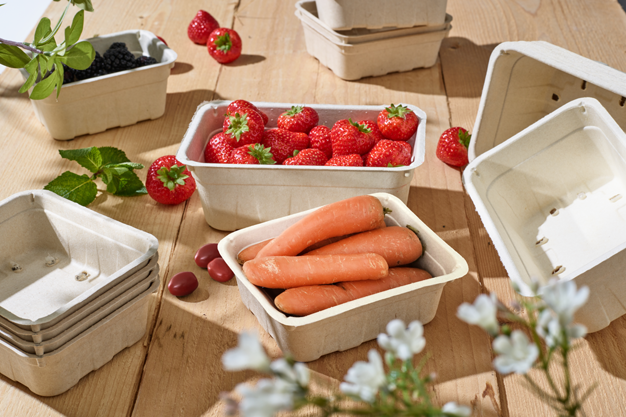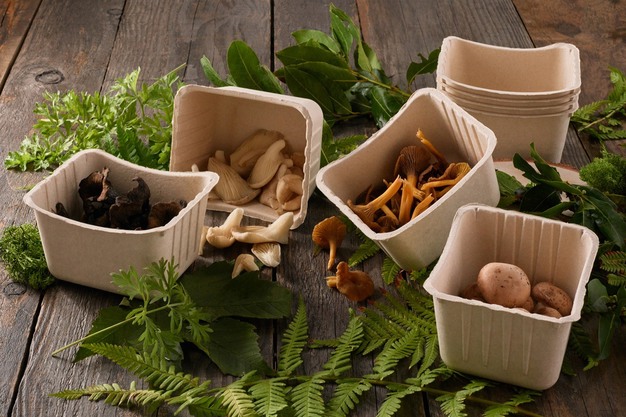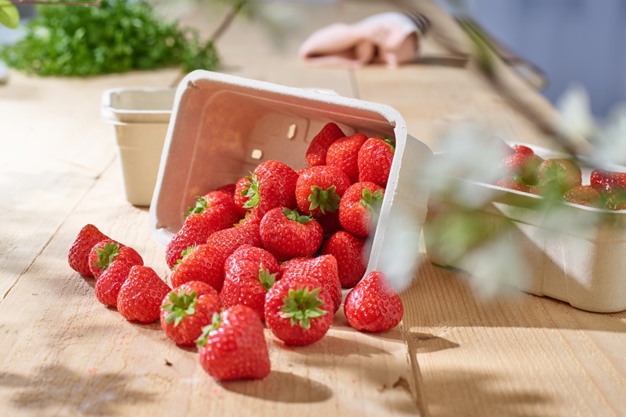Frédéric Salomon, co-founder and director of Daurema, a young company based near Lille, talks about the advantages of moulded cellulose for fruit and vegetables and the uncertainty in the sector following the recent cancellation of the Agec law decree.

Cellulose, a virtually infinite and renewable resource
Created in 2021, in the wake of the Agec law, Daurema was born of the meeting of three passionate and experienced people from the manufacturing sector: Florian Lefebvre, Frédéric Salomon and Cyril Forestier. Their objective was to develop a plant for the production of environmentally-friendly packaging and thus offer a viable alternative to plastic, hence the name of the company, Daurema, which means "sustainable" in Esperanto. To achieve their goal, the founders have put their faith in cellulose, "a natural fibre present in all plants, since it makes up between 35 and 50% of the fibre of each plant, and is a virtually infinite and renewable resource," explains Frédéric Salomon. "The material can be used to make packaging that can be recycled through the paper/cardboard chain, or composted at home."

"Good resistance to humidity and preserved packaging speed"
Where some alternatives to plastic trays (such as cardboard) quickly show their limitations, particularly for fruit and vegetables that release moisture, moulded cellulose offers greater resistance. These properties are made possible by its manufacturing process, as Frédéric explains. "Only one step is needed to make our trays: they come straight out of the mould, thanks to the shape chosen beforehand, which means that the product is more resistant to the damp conditions that are particularly necessary during storage before marketing." Daurema started out with a mushroom producer. "We started with the most difficult part! Mushrooms are 95% water, yet the tray did its job perfectly. Today, the company packages a wide range of fruit including apricots, peaches, kiwis, grapes and even strawberries. "The 2024 results are more than positive. We have not had any quality complaints, and our clients are very satisfied."
Another significant advantage of the trays offered by Daurema is that they can be unstacked, enabling the packaging lines to maintain their output. "An unstacking nipple has been designed to leave a fixed space between 2 trays, so they can be unstacked more easily. The stations maintain the same speed as with plastic trays. As we have seen on several occasions in recent years, certain cardboard trays can slow down the process or require investment in new equipment."

Uncertainty after the cancellation of the Agec decree
Not surprisingly, on November 8th, the French State Council annulled the decree implementing the Agec* law. This was a "major blow," according to Frédéric Salomon, who is worried about a return to plastic and a consequent loss of sales. "The future is very uncertain. The PPWR (Proposal Packaging and Packaging Waste Regulation) currently under discussion at European level may not see the light of day before 2030, or even later. In the meantime, what about plastic packaging between 2025 and 2030? Will the government issue a new decree? If so, what will it contain? For the moment, there are several possible scenarios, and many questions. According to initial feedback, some cooperatives are anticipating a return to plastic, but we must remember that the final decision-maker lies in the supermarket chain. If retailers decide to opt for plastic, our clients will have no choice but to comply, especially if they cannot pass on the extra cost of plastic-free packaging to supermarkets. While the difference is only 3 euro cents [0.032 USD] for cellulose trays, it is 4 to 5 times more for the cellulose film (produced by another European company) wrapped around the tray."
Mainly present on the French market, Daurema could take advantage of its geographical position (Wattrelos, Hauts-de-France) to penetrate other markets such as the Benelux countries, Germany and the UK. "There are rumours that some distributors on the other side of the border are asking their clients to stop using plastic.
*(on the grounds that the government could not issue the decree as early as June 2023, as the European Commission had asked France to wait until December 2023 because a new European regulation on packaging was being negotiated).

Initially specializing in fruit and vegetable packaging, Daurema will be extending its range to other sectors from February 2025.
 For more information:
For more information:
Daurema
5 Rue des Bonnetiers
59150 Wattrelos
Phone: +33(0)6 11 73 63 78
daurema.fr
